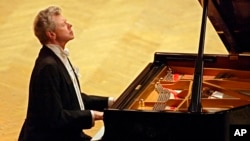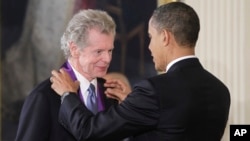Classical pianist Van Cliburn died February 27 at age 78 (born July 12, 1934). The legendary performer was only 23 years old when he captured the world's attention by winning the Tchaikovsky International Competition in Moscow. In addition to performing decades of concerts and recording numerous albums, he fostered the careers of young artists by creating several scholarship programs and establishing the annual Van Cliburn International Piano Competition in Fort Worth, Texas.
In 1958, Van Cliburn became an instant celebrity when he won the Tchaikovsky International Competition in Moscow. It caused a sensation for an American to win a Russian competition during the tense standoff between the United States and the Soviet Union known as the Cold War. Van Cliburn’s triumph in the competition was celebrated not only by Americans, but by Russians. New York Times Moscow correspondent Max Frankel covered the competition and later wrote that “The Soviet public celebrated Cliburn not only for his artistry but for his nationality; affection for him was a safe expression of affection for America.”
Van Cliburn won the competition on the strength of his performance of the Tchaikovsky's "Concerto No. 1."
When he returned to the U.S., RCA Records released Van Cliburn’s debut album containing the prize-winning work. The LP won a Grammy Award and sold more than one million copies, making Cliburn the first American artist to achieve platinum status with a debut release. Van Cliburn demonstrated his profound love of the music he performed, but felt its popularity went beyond his technical abilities.
"If you take a great piece of music into your heart, you take it for its great spiritual value," said Van Cliburn. "And when you look at a wonderful piece of music, even though it may enjoy popularity, if you examine its pages very carefully, you will find the reason. And it will always be a very good reason why it is popular.
Born in Shreveport, Louisiana on July 12, 1934, Van Cliburn began studying piano at age three with his mother, herself a talented pianist. Cliburn made his orchestral debut at age 12 with the Houston Symphony and five years later earned a scholarship to New York's prestigious Juilliard School. Following graduation, he spent several years performing with various major symphony orchestras, which led to his participation in Moscow's First International Tchaikovsky Competition. Cliburn brought to his performance not only great musicianship and tremendous technical skill, but a determination to please his audience.
"You always want to play well," he said. "You're always hoping to play well. And if you don't play well, YOU are the unhappiest person. So, you want to please your audience and you hope that you're being true to the music and also true to those who want to hear you."
Van Cliburn dedicated many years of his life to helping aspiring young artists by creating scholarship programs at schools and universities throughout the world. In 1962, he established the Van Cliburn International Piano Competition in Fort Worth, Texas. Over the years, the competition has enhanced the careers of numerous developing musicians.
"It's been so interesting to see the young people come," said Van Cliburn. "They meet each other and have friendships and musical correspondences. It's really very exciting. And it's like the same feeling I had when I went to Russia in 1958. The warmth and camaraderie - it carried through all through the years."
Critics praised Cliburn throughout his long career for his outstanding technical prowess and sense of lyrical romanticism. The humble virtuoso offered much of the credit for his success to his peers.
"One of the things that has always been an inspiration to me is to go to a concert and be thrilled,"he said. "And to be inspired by another person's successful concert. We're all so dependent on another person's success."
Van Cliburn found it difficult to balance his personal life with the demands of constant touring. In the mid-1970s, he abandoned the spotlight. But after 11 years off the stage, Cliburn began performing rare concert appearances, and toured extensively in the 1990s.
He was the recipient of some of the nation’s highest honors, including a Kennedy Center Honor, the Presidential Medal of Freedom, the National Medal of Arts, and a Grammy Award for Lifetime Achievement. Cliburn’s last appearance was in September at the 50th anniversary of the Van Cliburn International Piano Competition. Van Cliburn died Wednesday morning in Fort Worth, Texas. He was 78.
In 1958, Van Cliburn became an instant celebrity when he won the Tchaikovsky International Competition in Moscow. It caused a sensation for an American to win a Russian competition during the tense standoff between the United States and the Soviet Union known as the Cold War. Van Cliburn’s triumph in the competition was celebrated not only by Americans, but by Russians. New York Times Moscow correspondent Max Frankel covered the competition and later wrote that “The Soviet public celebrated Cliburn not only for his artistry but for his nationality; affection for him was a safe expression of affection for America.”
Van Cliburn won the competition on the strength of his performance of the Tchaikovsky's "Concerto No. 1."
When he returned to the U.S., RCA Records released Van Cliburn’s debut album containing the prize-winning work. The LP won a Grammy Award and sold more than one million copies, making Cliburn the first American artist to achieve platinum status with a debut release. Van Cliburn demonstrated his profound love of the music he performed, but felt its popularity went beyond his technical abilities.
"If you take a great piece of music into your heart, you take it for its great spiritual value," said Van Cliburn. "And when you look at a wonderful piece of music, even though it may enjoy popularity, if you examine its pages very carefully, you will find the reason. And it will always be a very good reason why it is popular.
Born in Shreveport, Louisiana on July 12, 1934, Van Cliburn began studying piano at age three with his mother, herself a talented pianist. Cliburn made his orchestral debut at age 12 with the Houston Symphony and five years later earned a scholarship to New York's prestigious Juilliard School. Following graduation, he spent several years performing with various major symphony orchestras, which led to his participation in Moscow's First International Tchaikovsky Competition. Cliburn brought to his performance not only great musicianship and tremendous technical skill, but a determination to please his audience.
"You always want to play well," he said. "You're always hoping to play well. And if you don't play well, YOU are the unhappiest person. So, you want to please your audience and you hope that you're being true to the music and also true to those who want to hear you."
Van Cliburn dedicated many years of his life to helping aspiring young artists by creating scholarship programs at schools and universities throughout the world. In 1962, he established the Van Cliburn International Piano Competition in Fort Worth, Texas. Over the years, the competition has enhanced the careers of numerous developing musicians.
"It's been so interesting to see the young people come," said Van Cliburn. "They meet each other and have friendships and musical correspondences. It's really very exciting. And it's like the same feeling I had when I went to Russia in 1958. The warmth and camaraderie - it carried through all through the years."
Critics praised Cliburn throughout his long career for his outstanding technical prowess and sense of lyrical romanticism. The humble virtuoso offered much of the credit for his success to his peers.
"One of the things that has always been an inspiration to me is to go to a concert and be thrilled,"he said. "And to be inspired by another person's successful concert. We're all so dependent on another person's success."
Van Cliburn found it difficult to balance his personal life with the demands of constant touring. In the mid-1970s, he abandoned the spotlight. But after 11 years off the stage, Cliburn began performing rare concert appearances, and toured extensively in the 1990s.
He was the recipient of some of the nation’s highest honors, including a Kennedy Center Honor, the Presidential Medal of Freedom, the National Medal of Arts, and a Grammy Award for Lifetime Achievement. Cliburn’s last appearance was in September at the 50th anniversary of the Van Cliburn International Piano Competition. Van Cliburn died Wednesday morning in Fort Worth, Texas. He was 78.







